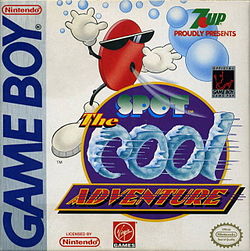| Spot: The Cool Adventure | |
|---|---|
 North American cover art | |
| Developer | Visual Concepts |
| Publisher | Virgin Games [1] |
| Designer | Cary Hammer |
| Artist | Dean Lee |
| Composer | John Loose |
| Series | Spot |
| Platform | Game Boy [1] |
| Release | |
| Genre | Platform [1] |
| Mode | Single-player |
Spot: The Cool Adventure is a 1992 platform game developed by Visual Concepts and published by Virgin Games for the Game Boy. It is a port of the NES game, M.C. Kids . The Game Boy version was released outside of Europe and was localized with the 7 Up mascot Spot as Spot: The Cool Adventure.
Contents
The game structure is based on M.C. Kids, although the map screen closely resembles Super Mario Bros. 3 . Getting hit causes players to lose health. In addition to avoiding enemies, Spot can jump or collect blocks to help him reach hearts in other locations. [2]